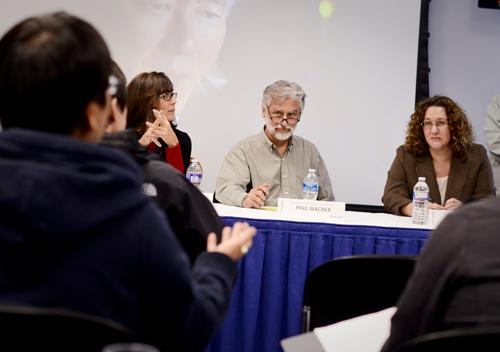
This post was written by Hatchet reporter Joy Finneran.
South Korean media professionals came to campus this week for a four-day global digital media workshop hosted by the School of Media and Public Affairs that focused on creative uses modern technology.
In a partnership between the Korean Producers Directors Educational Association and GW’s Center for Innovative Media, the inaugural program invited more than two-dozen mid-career journalists from the Korean Broadcasting Service and other Korean media outlets for a series of interactive presentations from about 15 speakers.
Nina Seavey, co-director of the Center for Innovative Media, said the goal of the program was to explore revolutionary ways to utilize new media, as opposed to the technology itself.
“We want to introduce them to the forefront of content creation, and introduce them to the uses of these technologies,” Seavey, who is also a research professor of history and of media and public affairs, said.
The week’s sessions ranged from talks on storytelling to an analysis of reality television.
Josh Green, a filmmaker and vice president of digital distribution company Emerging Pictures, discussed new ways to fund films, including crowd sourcing through websites like Kickstarter and Indiegogo, in a presentation Wednesday.
“It’s a new mechanism to bring your fanbase into the movie that also allows you to make some money off of it,” Green said.
He suggested the use of programs like Twitter and Skype to help spread information about films and to forge a stronger connection between audience members and filmmakers.
In a panel discussion Thursday, Jeanne Meserve, a former CNN correspondent and a senior fellow at GW’s Homeland Security Policy Institute, offered ways to distribute media online that compliment her work on television.
Kim Seung Hee, an aspiring young filmmaker from South Korea who seeks to make a documentary that focuses on an elderly, forgotten singer that was popular decades ago, received tips from panelists at the workshop on how to better target an audience.
“Know your audience,” award-winning independent non-fiction producer Liz Brach advised. She explained that engaging viewers and readers is key when working in media.
Seung Hee’s goal is to make the documentary appeal to all audiences – young, old, Korean and American.
Seavey likewise looks to expand the international profile of SMPA by holding more media workshops in the future that bring in journalists from around the world who seek to gain high-level skills to make them more competitive in the profession.
“We want to make GW the epicenter for everything that is new in global digital media,” Seavey said.




